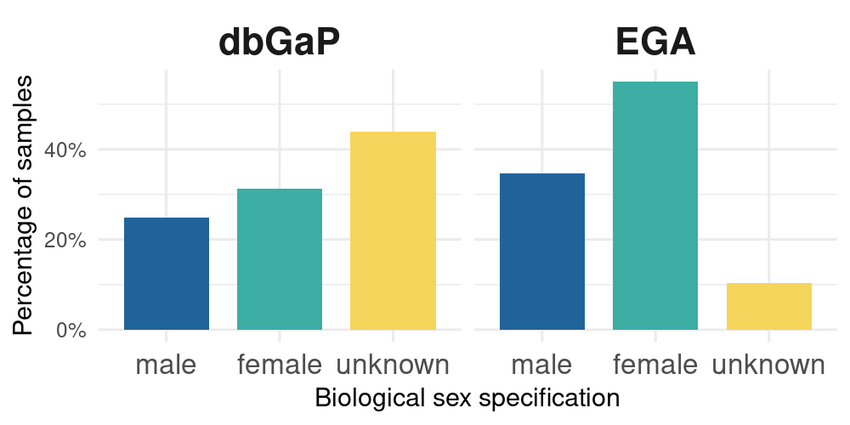A survey addressed to users, creators, maintainers, and developers of biological databases revealed that specialized training and additional knowledge about diversity criteria are required. Based on our findings, we raise awareness of sample bias problems and provide a list of recommendations for enhancing biomedical research practices
Abstract
This paper focuses on the relevance of variables such as sex, age, or race for tailored treatments for precision medicine and the use of said variables on clinical studies and sample records. When these fields are not specified, it can result in biased predictions as they will not be considered in the training of the AI algorithm. In this work we quantified biases in sex classification over time in human data from studies deposited in EGA and the database of Genotypes and Phenotypes (dbGaP), which represents the EGA's equivalent in the USA. The main result is that the EGA policy is effective to fight sex classification biases because there are significantly less samples classified as unknown after 2018 in this repository than in dbGaP. Additionally, we qualitatively assessed public opinion on this issue.
Addressing sex bias in biological databases worldwide
Author/s: Victoria Ruiz-Serra, Nataly Buslón, Olivier R. Philippe, Diego Saby, María Morales, Camila Pontes, Alejandro Muñoz Andirkó, Gemma L. Holliday, Aina Jené, Mauricio Moldes, Jordi Rambla, Alfonso Valencia, María José Rementeria, Átia Cortés, Davide Cirillo
Date: 2023
Link: https://biohackrxiv.org/n9dkg
DOI: 10.37044/osf.io/n9dkg
We examine the current sex and gender gaps in a subset of biomedical technologies used in relation to Precision Medicine. In addition, we provide recommendations to optimize their utilization to improve the global health and disease landscape and decrease inequalities.
The study, promoted by the non-profit organization The Women’s Brain Project and supported by the Bioinfo4Women programme at the BSC, has been published today in Nature Digital Medicine.
The application of artificial intelligence (AI) to the biomedical sector is leading us to a better understanding of human diseases, facilitating their prevention, diagnosis, personalised treatments and, in general, precision medicine.
The success of precision medicine largely depends on overcoming a number of challenges, many of which are inherently related to the responsible use of AI in research and healthcare. To meet these ambitious objectives, it is essential to account for the risks of neglecting differences among individuals that reflect the clinical characteristics of diseases and drugs response, such as sex and gender differences.
The researchers involved in this analysis warn about the need for the community in its entirety, including governments and policy makers, to become involved in addressing the ethical issues associated with each stage of the technological development for health.
Sex and gender differences and biases in artificial intelligence for biomedicine and healthcare
Author/s: Davide Cirillo, Silvina Catuara-Solarz, Czuee Morey, Emre Guney, Laia Subirats, Simona Mellino, Annalisa Gigante, Alfonso Valencia, María José Rementeria, Antonella Santuccione Chadha & Nikolaos Mavridis
Date: July 2019
DOI: 10.1038/s41746-020-0288-5


